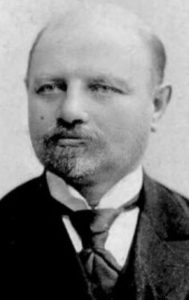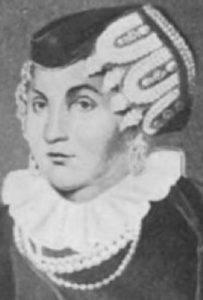The Man Who Tried to Save a Million Jews
 Jenő Yoel Brand (1906-1964) was born in what is now Romania to a family of traditional Hungarian Jews. He spent a part of his childhood in Germany, and then moved to New York when he was 19. He struggled to make a living, working difficult odd jobs, and eventually joined the International Communist Party, soon becoming one of their sailors and traveling across the Pacific. He returned to Germany in 1930, but when Hitler came to power Brand was arrested for being a communist. He was released the following year and returned to Hungary, joining the communist-Zionist Poale Zion organization, and then the Jewish National Fund. He started a clothing business with his wife, and the couple grew wealthy, employing over 100 people in their factory. The Brands were planning to make aliyah and join a kibbutz, but an influx of German Jews entering Hungary compelled them to stay and support the refugees. By 1943, they had set up the Aid and Rescue Committee, forging documents and running an underground network of safe houses. All in all, the committee saved about 25,000 Jews, at times collaborating with people like Oskar Schindler and Rudolf Kastner. In 1944, the Nazis invaded Hungary, and notorious SS officer Adolf Eichmann requested a meeting with Brand. He offered 1 million Jews in exchange for supplies from the Allies to help German soldiers fighting the USSR. Eichmann called it the “blood for goods” deal, and wanted 1000 trucks full of supplies for every 100,000 Jews. After three meetings, he gave Brand several weeks to come back with an answer. Brand immediately got on a train to Istanbul, planning to meet up with future Israeli president Chaim Weizmann. When he arrived, it was a different “Chaim” waiting for him, offering no assistance. Brand felt betrayed by the Jewish Agency, who told him to now go to Aleppo and meet another future Israeli president, Moshe Sharett. On the way, Brand was stopped by the British and arrested, imprisoned in Egypt and brutally tortured. The British had no interest in saving Jews, nor bringing in anymore refugees into the Holy Land. (In fact, during the little-known 1943 Bermuda Conference, the British and Americans had already decided to do nothing about the Holocaust and resolved not to help the Jews of Europe.) Brand eventually went on a hunger strike, and was only released after 17 more days. By that point, most of the Jews he was trying to save were already murdered. Brand was not permitted to return to Hungary, and resettled in Israel. Not surprisingly, he joined the Stern Gang that fought passionately against the British to expel them from the Holy Land. Brand went on to testify at the 1954 Kastner trial, as well as the 1961 Eichmann trial, where the latter denied that he ever had the authority to stop the mass-killings. Some say the “blood for goods” deal was a Nazi ruse and only meant to confuse and split the Allies. Others say it was a legitimate offer made by desperate Nazis, and a million Jews could have been saved. Brand himself believed a bit of both. Shortly before his death, Brand told a reporter: “An accident of life placed the fate of one million human beings on my shoulders. I eat and sleep and think only of them.” Brand died, quite literally, of a broken heart, suffering a fatal heart attack at the young age of 58.
Jenő Yoel Brand (1906-1964) was born in what is now Romania to a family of traditional Hungarian Jews. He spent a part of his childhood in Germany, and then moved to New York when he was 19. He struggled to make a living, working difficult odd jobs, and eventually joined the International Communist Party, soon becoming one of their sailors and traveling across the Pacific. He returned to Germany in 1930, but when Hitler came to power Brand was arrested for being a communist. He was released the following year and returned to Hungary, joining the communist-Zionist Poale Zion organization, and then the Jewish National Fund. He started a clothing business with his wife, and the couple grew wealthy, employing over 100 people in their factory. The Brands were planning to make aliyah and join a kibbutz, but an influx of German Jews entering Hungary compelled them to stay and support the refugees. By 1943, they had set up the Aid and Rescue Committee, forging documents and running an underground network of safe houses. All in all, the committee saved about 25,000 Jews, at times collaborating with people like Oskar Schindler and Rudolf Kastner. In 1944, the Nazis invaded Hungary, and notorious SS officer Adolf Eichmann requested a meeting with Brand. He offered 1 million Jews in exchange for supplies from the Allies to help German soldiers fighting the USSR. Eichmann called it the “blood for goods” deal, and wanted 1000 trucks full of supplies for every 100,000 Jews. After three meetings, he gave Brand several weeks to come back with an answer. Brand immediately got on a train to Istanbul, planning to meet up with future Israeli president Chaim Weizmann. When he arrived, it was a different “Chaim” waiting for him, offering no assistance. Brand felt betrayed by the Jewish Agency, who told him to now go to Aleppo and meet another future Israeli president, Moshe Sharett. On the way, Brand was stopped by the British and arrested, imprisoned in Egypt and brutally tortured. The British had no interest in saving Jews, nor bringing in anymore refugees into the Holy Land. (In fact, during the little-known 1943 Bermuda Conference, the British and Americans had already decided to do nothing about the Holocaust and resolved not to help the Jews of Europe.) Brand eventually went on a hunger strike, and was only released after 17 more days. By that point, most of the Jews he was trying to save were already murdered. Brand was not permitted to return to Hungary, and resettled in Israel. Not surprisingly, he joined the Stern Gang that fought passionately against the British to expel them from the Holy Land. Brand went on to testify at the 1954 Kastner trial, as well as the 1961 Eichmann trial, where the latter denied that he ever had the authority to stop the mass-killings. Some say the “blood for goods” deal was a Nazi ruse and only meant to confuse and split the Allies. Others say it was a legitimate offer made by desperate Nazis, and a million Jews could have been saved. Brand himself believed a bit of both. Shortly before his death, Brand told a reporter: “An accident of life placed the fate of one million human beings on my shoulders. I eat and sleep and think only of them.” Brand died, quite literally, of a broken heart, suffering a fatal heart attack at the young age of 58.
Short Animation: How the Ottoman Empire Was Carved Up
The KGB and Anti-Israel Propaganda
Words of the Week
The local population in Palestine is racially more closely related to the Jews than to any other people… It is quite probable that the fellahin in Palestine are direct descendants of the Jewish and Canaanite rural population, with a slight admixture of Arab blood… it is impossible to distinguish between a Sephardic porter and an Arab labourer…
– Dov Ber Borochov (1881-1917)




